Yves here. This John Helmer post explains that ordinary Poles are mighty unhappy with Zelensky not apologizing for the errant Ukraine US300 missile that killed two Polish farmers yesterday and nearly dragged NATO into the conflict and instead continuing to insist Russia did it.1 Some Polish officials even contend that the shot into Poland was no accident, since it was implausibly far from where Russia was attacking.
Helmer points out that it is the big cities and their companies that have benefitted from the US war spending, and the US also supports (!!!) the political party that represents them. But there has long been an urban/rural split in Poland. A controversial postponement of local elections suggests that the elites are worried about their hold.
Breaks in the heretofore stalwart support of Poland for Ukraine is coming when the expected flight from Ukraine due to electrical grid destruction has yet to start. Last week, for instance, in and out flows of Ukrainians were nearly equal.
By John Helmer who has been the longest continuously serving foreign correspondent in Russia, and the only western journalist to have directed his own bureau independent of single national or commercial ties. Helmer has also been a professor of political science, and advisor to government heads in Greece, the United States, and Asia. Originally published at Dances with Bears
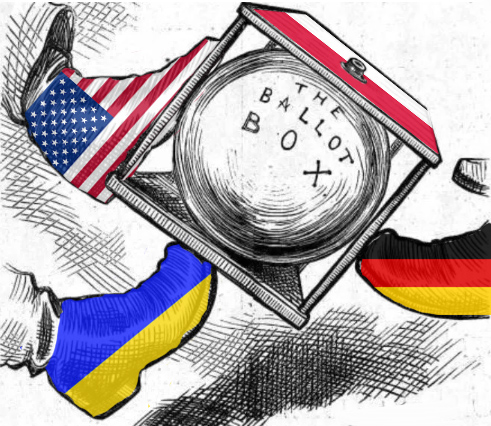
No one in Poland is in any doubt now that Tuesday’s missile attack on Przewodów* village, eight kilometres west of the Ukrainian border, was caused by a Russian-made missile fired by the Ukrainian military acting on the orders of President Vladimir Zelensky in Kiev. Two villagers were killed by the Ukrainian action. That Zelensky continues to deny this makes him a liar throughout Poland.
Polish President Andrzej Duda has made this official. “There is a high probability that it was a missile that was used for missile defense; that is, it was used by the Ukrainian defence forces”. Duda justified the action by telling Polish voters: “Ukraine defended itself – which is obvious and understandable – by firing missiles which were tasked with hitting Russian missiles.”
Duda was sharply and publicly corrected by the national party politician closest to the incident, Jaroslaw Pakula, the head of the Lublin City Council. “ ‘Of course, it’s a Ukrainian rocket. Of course, this is a provocation on the part of the Ukrainian authorities…The rocket could not be fired 100 km in the opposite direction by mistake.’ The aim of the provocation was to scare the EU and gain civil society support to send even more weapons to Ukraine, Pakula added. Instead of saying ‘fairy tales’ about the missile, the Polish president should tell Ukrainian Vladimir Zelensky that Warsaw ‘will no longer put up with this behaviour’ by Kiev.”
Pakula posted his commentary on his Facebook account. “I urge you to rethink Poland’s position [looking] at this war in case the red line is crossed again!” Pakula told Duda and the leadership of the Law and Justice Party (PiS) in Warsaw.
Zelensky told the Polish Government: “I have no doubt that this is not our missile. I believe that this was a Russian missile, based on our military reports.” In a full text of his remarks republished from Ukrainian into Polish by the state Polish Press Agency (PAP), Zelensky added: “It was not our rocket, not our missile strike…I am convinced that we should and will [take part in the Polish investigation]…I want us to be fair, and if it was the use of our air defense, then I want that evidence. First the investigation, access, and the data you [Polish government] have.”
The Polish news agency also reported the head of Ukraine’s National Security and Defense Council as claiming: “we are ready to provide our [Polish] partners with the evidence of the Russian footprint that we have. We also expect information from the partners, on the basis of which the final conclusion was drawn [by the Poles] that it is a Ukrainian air defense missile.”
Former Polish senator for the opposition party Civic Platform (PO), Robert Smoktunowicz, commented: “Not only have we not yet received an apology and expressions of regret from the president. Zelensky for the explosion and death of two Polish citizens. What is worse, the Ukrainian side denies its responsibility and demands evidence from the Polish side. What went wrong after February 24?”
Stanislas Balcerac, an independent political analyst based in Warsaw, acknowledges that the Ukrainian missile attack has struck at the rural heartland of eastern Poland which has voted solidly for the PiS party to win the provincial council and governorate (voivodeship) elections of October 2018; and likewise the national parliament (Sejm) elections of October 2019 and the presidential election which Duda won narrowly in June 2020.
“The PiS has had to fight on three fronts,” Balcerac said “coronavirus, the war in Ukraine, and Brussels’ game of blocking European Union money for Poland. That’s quite a lot.”
He believes the PiS and its leaders – Duda, Prime Minister Mateusz Morawiecki, and party leader Jaroslaw Kaczynski — must maintain a balancing act in public, but privately they are furious at Zelensky’s statements. In the context of the current war, adds Balcerac, “Poland has a specific history with both Germany and Russia.”
In Warsaw, that phrase “specific history” means much more than anyone can calculate in votes for the moment.
The moment won’t last, comments a veteran NATO military analyst. “It hasn’t gotten hard enough for the Poles or Ukrainians. Winter hasn’t sunk in yet. We’ll know better in a week or three.”
The latest national polls for next year’s Sejm elections reveal that since the Russian special military operation began on February 24, Polish voters have not shifted in their party loyalty or vote intention outside the margin for statistical error. The PiS stays ahead of the opposition coalition led by the Civic Platform (PO) by seven percentage points.
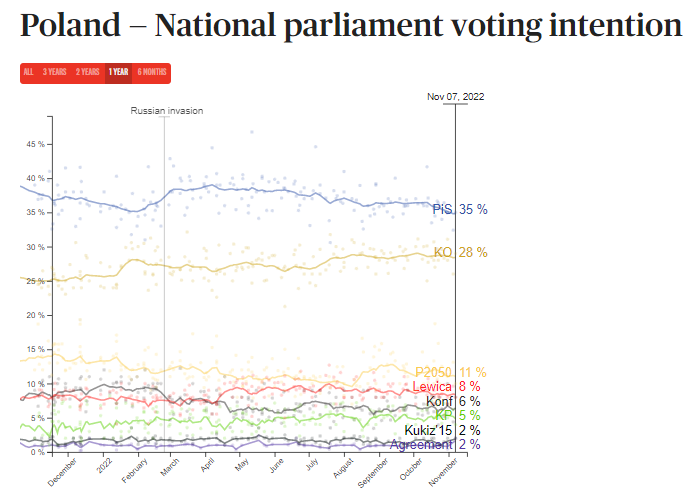
Source, with guide to party nomenclature and acronyms: https://www.politico.eu/
The split down the middle of the country, the blue east for PiS and the orange-red west for the opposition, was illustrated in the provincial vote of 2018. Local elections were held on October 21 of that year for all 16 provincial (voivodeship, województwo) assemblies, 380 county (powiat) councils, and 2,477 commune (gmina) councils. There were also direct elections for commune heads (mayors and city presidents). The outcome overall was victory for the PiS. The opposition PO and Civic Coalition (KO) maintained control of the majority of cities, including the capital Warsaw.
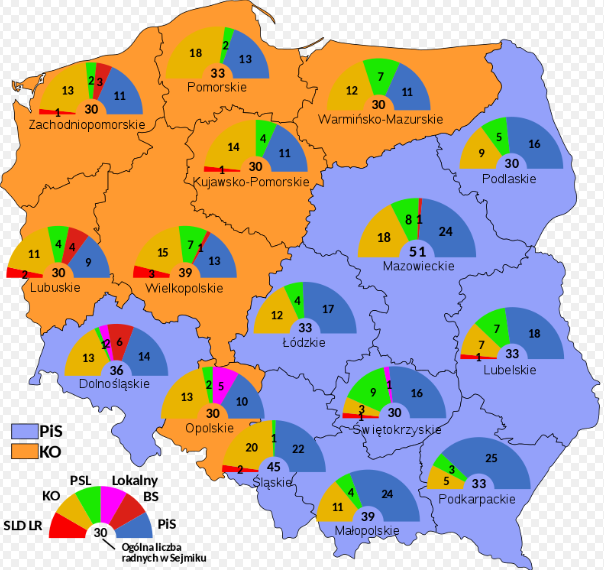
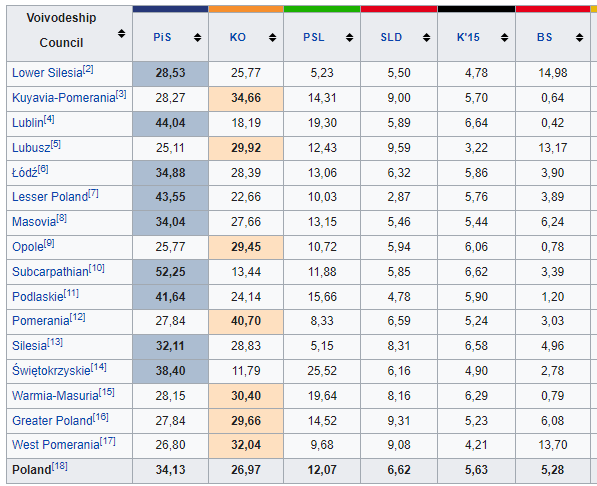
Source: https://en.wikipedia.org/
For chart displays and analysis of the east-west split in the Sejm and in the Duda election, read this.
Polish pollsters and sociologists have confirmed that this split between the urban elites and the rural voters is much older. But they have been reluctant to point out that in the cashflow which the war has generated, as the US, NATO and the European Union pour money, arms, advisers, special forces, and equipment through Poland and across the border, the Polish big-city commercial and political elites have been profiting.
Jarosław Flis is a well-known sociologist at Jagiellonian University in Cracow; his last academic study of Polish vote dynamics was published in 2015. In April of this year, immediately after the military operations began along with the surge into Poland of Ukrainian refugees, Flis said he expected a rally-round-the-flag effect to help the PiS in Warsaw. Balcerac said the same. Most Polish political analysts thought so, and the PiS leaders were reassured by their internal polling. That was also the political motive for Morawiecki and Kaczynski to stage their Zelensky meeting on March 15, and for Duda’s trip to Kiev on May 22.
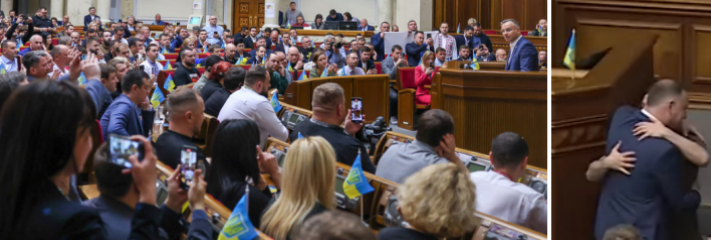
Left. President Duda at the rostrum of the Verkhovna Rada, May 22; right, President Zelensky embracing Duda at the conclusion of the speech. For the video record at the Ukrainian parliament, click.
This was the consensus countrywide in April. “The satisfaction of the traditional supporters of the government is not surprising, as almost 100 percent of them are in favour of the government’s policy regarding Ukraine — 48 percent considered the response to be ‘definitely good,’ and 49 percent ‘rather good.’ ‘I don’t find those results surprising, because everyone is giving Poles credit and talking about how fanatically we are helping,’ said Anna Materska-Sosnowska, a political scientist from the University of Warsaw. A similar point of view is presented by Jarosław Flis, a sociologist from the Jagiellonian University, who says that the results of the poll show that the rating breaks away from the political preferences in general. ‘In this poll, specific actions are being evaluated rather than political preferences. From the government’s perspective it means that it is not necessary to create internal conflicts to receive positive ratings,’ Flis added.”
That was then. What about now, six months later, as winter approaches?
The PiS leadership is unsure of itself and unsure of Polish voters. So they have used their majority in the Sejm to postpone the provincial elections from 2023 into 2024. Most Polish voters have reacted negatively to this ploy. “A United Surveys poll published yesterday by Dziennik Gazeta Prawna and RMF found that a majority of the public (57%) want the local elections to take place in autumn 2023 as planned, while only 21% want to delay them.”
The Sejm elections cannot be put off from next autumn. And now pollsters like Flis are warning that there’s a danger to the PiS from small-town independent candidates and party mavericks like Pakula from Lublin.

Szymon Holownia, an independent who ran for president in 2020, speaking during his campaign visit to Katowice. Source: https://balkaninsight.com//
Holownia is a journalist from Białystok, the largest Polish city in the northeast, bordering Belarus.
“Flis describes Polish society’s political preferences using a tree metaphor: the roots, made up of villages, are usually PiS voters; the crown, towns above 100,000, prefer the liberal opposition – so far, big city voters chose primarily the main opposition force PO; but the trunk, made up of small towns between 10,000 and 100,000 people, remain in contention, Flis argues, as the hundreds of mayors of these towns are at the moment neither under the sway of PiS nor that of PO.”
“Szymon Holownia [pictured above], who ran in the presidential election as an independent on a progressive Catholic platform, has since formed a political party and begun attracting parliamentarians from others parties. He might be tempted to move into this area, Flis says, though adding that so far it’s unclear whether Holownia has what it takes to achieve this. ‘Conquering ‘the trunk’ doesn’t work on its own; it’s not like these people are just sitting there waiting for salvation. You need a powerful idea to win,’ Flis said. ‘We’ve seen several such new political forces emerge in the last years, but more is needed to win than just being new… For the moment, we have order on the political scene: the old balance of power between PIS and PO is still there,’ he added.”
Balcerac has been reporting that the US Embassy in Warsaw and US government sources of money for Poland are backing the defeat of PiS next year by the PO, and the return to power of politicians like Anne Applebaum’s husband, Radoslaw Sikorski.
A North American expert in the electric war being conducted by the Russian Army cautions that the winter weather has yet to impact on the movement of Ukrainians across the Polish border. This is corroborated by the daily bulletins from by the Polish Border Guard. They reveal that in the week from November 9 through November 15, the average inflow per day of Ukrainians into Poland has been 19,400; the average outflow of Ukrainians back home, 19,900. Compare these numbers with the October daily average of 23,900 into Poland; the data were analysed here.
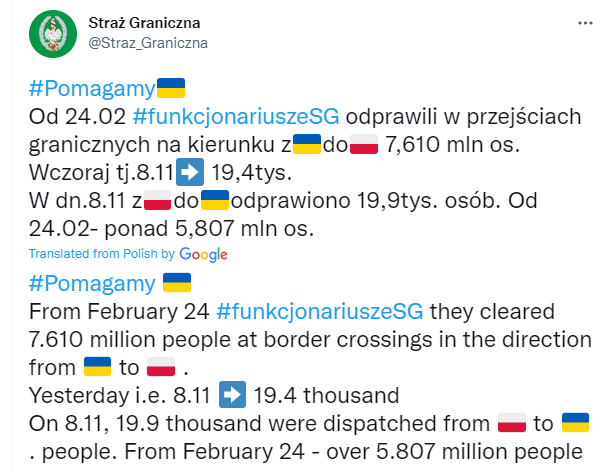
Source: https://twitter.com/straz_graniczna
Before the heavy Russian air raids of November 15, the peak border movements were recorded on November 12 – 25,200 entering Poland; 24,800 returning to the Ukraine. The Polish data for November 16 and 17 have not yet been released.
The weather forecast for Cracow, Lublin and Lvov, across the border, is almost the same; this indicates that the freeze has already begun in the evenings and the snow will arrive next week, though it may not freeze solid until the beginning of December.
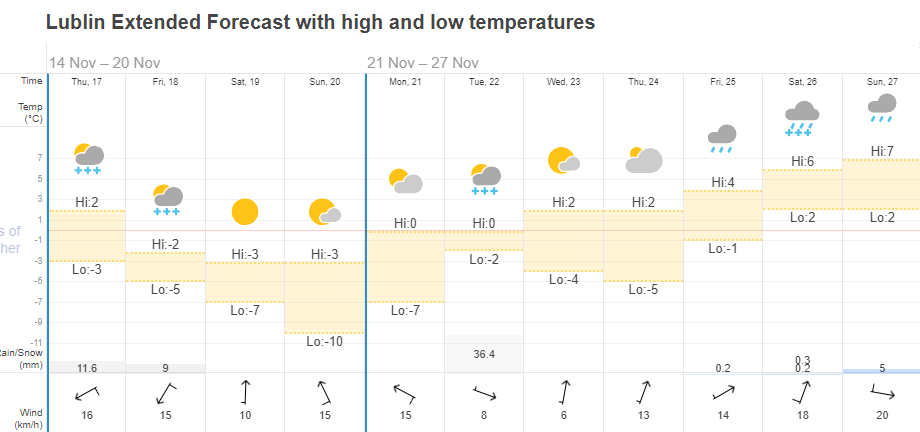
Source: https://www.timeanddate.com/
When the Russian electric war and General Winter strike in combination, what will Polish voters think then, and what they will tell the pollsters?
It is obvious to Polish analysts that when the surge of Ukrainian refugees across the border starts again, it will be in the regions and cities where the Ukrainian concentration is already highest that the political and economic impact will be registered most clearly. In April a Warsaw think tank reported these were the cities with the highest Ukrainian populations after the first surge:
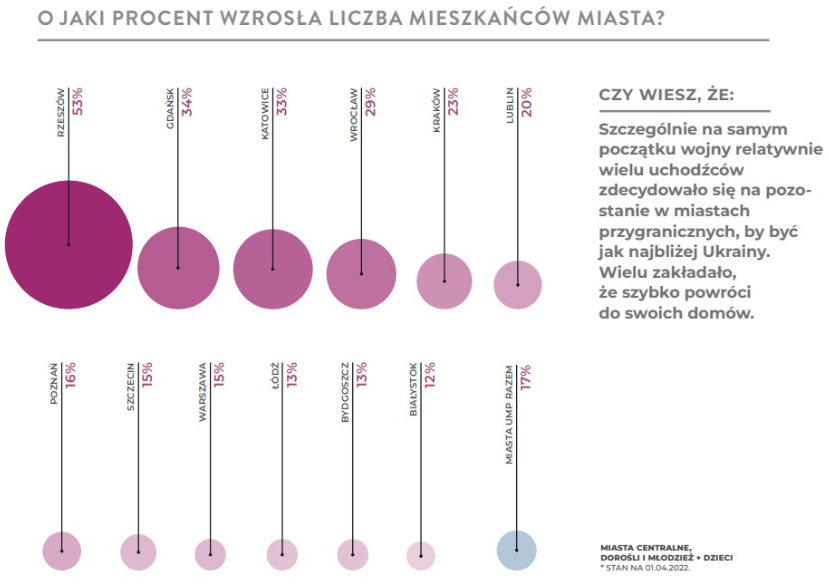
PERCENTAGE INCREASE IN POLISH CITIES FROM UKAINIAN REFUGEE FLOW, FEBRUARY-APRIL 2022
Key: Rzeszów: +53%; Gdańsk: +34%; Katowice: +33%; Wrocław: +29%; Kraków: +23%; Lublin: +20%; Poznań: +16%; Szczecin: +15%; Warsaw: +15%; Łódź: +13%. Source: “Urban hospitality -- rapid growth, challenges and opportunities”, Report on Refugees from Ukraine in the largest Polish Cities, Centre for Analysis and Research of the Union of Polish Metropolises, April 2022: https://metropolie.pl/
For comment.
The PiS and PO staffs have been busy analyzing what will happen to their voter support in these cities after the new surge. For the time being there are no public poll results available.
What can be expected, however is that this will be obvious in Rzeszow, which is a town of 184,000 located south of Lublin and midway between Cracow and Lvov. In its last council election in June 2021, the opposition PO won with 57%, while the PiS trailed at 24%. It was an unexpected landslide against the PiS, the local press reported at the time. In Cracow, where the Ukrainian concentration is much less, the PiS is in the minority of the city council.
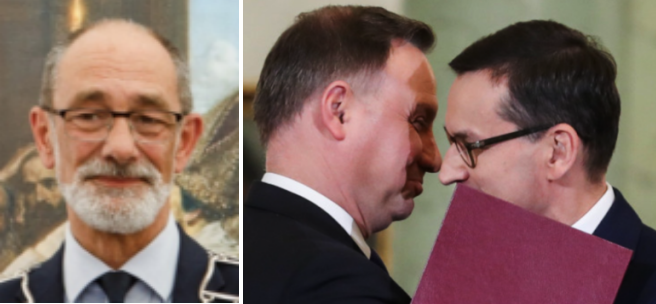
Left to right: Jaroslaw Pakula, Andrzej Duda, Mateusz Morawiecki.
It is here in Polish Galicia that the Ukrainian attack on Przewodów and Zelensky’s lying about it strike hardest. Who now speaks for the Poles? – Pakula in Lublin or Duda and Morawiecki in Warsaw? And if it turns out that Zelensky can’t hold on to the Poles, will his grip on the Germans and French fail soon after?
[*] Pronounced PSHEH VAW DOOF.
____
1 Fastidious Ukraine skeptics like the Alexes of The Duran point out that calling this S300 “Russian” is inaccurate, since it was a Soviet system and I believe Ukraine even manufactured them. FWIW, Andrei Martyanov gets hot under the collar about depicting all S300s as equal, since the more recent vintages are much more sophisticated.


The origin of the missile stinks Ukrainian and spells desperation in Zelenski’s regime if they believe this is the way to drag NATO to (more) direct confrontation in Ukraine. Suggests that the fall of the regime might come sooner than expected when General Winter establishes headquarters. Neocons here and there must be very worried about total failure. Will we be able to identify all the figures implicated in the design of this war and bring them to questions? Doubtful. The media won’t want to investigate having been them so implicated in the scam.
Thank you, Yves.
You ask this question, “Why Don’t The Poles Admit the War Isn’t Winning the Next Polish Election and Isn’t in Poland’s National Interest – Unless Zelensky Loses Galicia to Poland, Again?”
The post mentions neo con power couple Anne Apfelbaum and Radek Sikorski.
When Sikorski became a minister and was elected speaker of the Sejm / lower house, he had to declare his income and that of his wife. Most of their earnings are / were from the MIC. I say are as Sikorski is part of the US funded European Leadership Network and still indirectly on the US pay roll. Their sons went to Eton and Oxford. The fees for these elite establishments don’t pay for themselves.
The pair are also neo liberal and favour the privatisation of anything that moves. Sikorski went to Oxford, Pembroke College, and had all his fees paid for by the long suffering British taxpayer, “the good old days”. He has pulled the ladder up. At Oxford, he pretended to be “temporarily embarrassed” Mitteleuropa aristocracy and related to the WW2 general and was invited to join the Bullingdon Club, much to the disgust of Buller wannabes like James Delingpole, who then had the unrequited hots for Buller groupie Rachel Johnson, and Toby Young, all future shills.
Further to the recent post about Annalena Baerbock, this is how partly Europe’s leadership appears to act against Europe’s interest. I say partly as some of these types / factions have their own reasons for opposing Russia and don’t need US funding for that.
The former has been on UK and CNN International air waves a lot recently. The latter was often in the summer. Perhaps, they take in turns to manage the, er, um, tax efficiency of the cash flow.
Thank you CS. Hypocrisy is a word that doesn’t fit well enough with the behaviour of this people. Malice, greed to the extent of extremely idiotic malice and greed sounds more proper to me. Particularly idiotic in the case of that “asset” with Baerbock for public surname.
Thank you, Ignacio.
From 2007 – 16, I worked with such people in London and Brussels. One needed a shower afterwards.
They are a deracinated elite, “citizens of nowhere”, and have no stake in their local communities. In that regard they are different from the older, often landed, elites. It’s also one reason why more Europe or a deepening of the alliance with the US is the their only solution.
As financialisation took hold in the last 40 odd years, deracination and further alignment with the US, not just on military matters, increased.
Deracinated. Desarraigados in my mother’s language. It is nice to learn English here in good company and at the same time learn from their/your experiences. I think it sums up well with these otherwise difficult to understand behaviours.
Thank you, Ignacio.
I know Spain a bit and used to go out with a(n ex) colleague from San Fernando (the one between Cadiz and Jerez) and still visit Spain, often with her.
From the Iberian Peninsula, I would say Aznar (later employed by Murdoch), Luis de Guindos, Rodrigo Rato and Barroso (later employed by Goldman Sachs) are deracinated. I would add that the dynasties in control of Banco Santander, who I have met in London, and Inditex are increasingly detached from their homeland.
Radek Sikorski used to work for Santander.
Yep. Banco de Santander has a special (in not a good sense) behaviour with clients while BBVA is more serious or traditional with better treatment of their clients.
I could honestly see a failure of recently graduated troops firing the missile leading to the current issue. While that doesn’t excuse it, I am somewhat comfortable to ascribe things to incompetence and stupidity at first hand, and I generally consider malice when it’s repeated.
It may certainly be a 4d chess move by Ukraine (or a false flag operation by whoever), but I doubt it.
It could be, but the only Russian target w/in S300 range of the Polish landing is Lvov, with the spot in Poland straight north.
But Russia was firing from the east and south. The air defense therefore should be aiming at the incoming strikes, as in east or south, and not a northern flight path.
There are equipment failures. S300 maneuvers to target. Scenario of a missile aimed east at the incoming target landing west instead, is not impossible.
The US tracked the missile and for once have been very considered in their response. This is indicative of Yves point being valid.
What I’m pointing to is that S300 is fired in a very steep trajectory, not really aiming at incoming missiles, especially the low flying maneuvering ones. After 10 to 18 s the solid fuel booster cuts off and the rocket travels at about 1.8 km/s (hypersonic). It requires low level flight control commands from the ground station to chase the target. Absent these, given its altitude and velocity, it can land even 200-300 km from its launcher. The theoretical limit on a purely ballistic trajectory is about 400 km. This illustrates the range of equipment failure scenarios. I’m not aware how US tracking data proves or disproves equipment malfunction theory.
What keeps this in false flag territory is the fact that, if it was an error Zelensky tried to blame Russia for what he knew to be an error. As noted, the NATO reaction must reflect more than a simple refusal to accept this particular lie of Zelensky’s. NATO has its own escalation logic that it doesn’t want accelerated and Zelensky is forcing them into public disavowals that they hope would succumb to their processes of erasure but which inevitably create a kind of backlog of questions that threaten to spoil their propaganda effort.
I suppose the Ukrainian plan was to wait for the next wave of missiles, fire off one of their own to hit in Poland, and then use that as an excuse to call in NATO with the help of “friendly” countries. Well it did not go as expected as that missile killed two poor suckers going about their farm work. When it became obvious that it was in fact a Ukrainian missile, I would have expected Zelenski to make a quick trip to Poland, offer his apologies and condolences over a “technical hitch” and then meet the families to offer some sort of compensation, all of which incidentally would have made great PR. Zelensky did none of that. Like all good neocons, he doubled down. The Poles aren’t stupid. They know who fired that missile and probably why. And I bet that the average Pole is seriously unimpressed.
This desperation points to another danger to the west. Zelenski is really desperate right now. And I mean really desperate as things are about to fall down on his head. So there is a story in Links about Ukrainian-influenced Nazis being picked up in Italy. And they would not be the only ones. So what if the Kiev regime gets some of these “friends” of theirs in the EU to stage a provocation which they could blame Russia for. It could be blowing up one of their own Embassies with a truck bomb or perhaps the murder of some European politician. Doesn’t matter who gets killed. So long as they have that provocation that they could use as a vehicle to get NATO into the Ukraine. It might work. Even now after everybody knows that it was a Ukrainian missile that hit Poland, all the western leaders are saying that it does not matter as Russia is ultimately responsible.
Problem for Z is desperation might meet fear. It should indeed!
Since Ukraine has committed an unprovoked act of aggression against Poland, will Poland invoke Article 5 and call for a NATO war against Ukraine?
Indeed. After all, isn’t this all about enforcing the ‘rules-based-international-order’?
heh heh
As usual, it all comes down to whose ox is gored.
And re: RK‘s comment above
> … all the western leaders are saying that it does not matter
> as Russia is ultimately responsible. [emphasis added]
I worked for some years in a third-world country for a very big local company. We expats lived in a compound in company-provided housing but we went into town daily and had plenty of congenial interaction with the local population. One day a friend of mine was driving in town when a local ran a stop sign and t-boned his car. Thank luck nobody was injured. However, the first policeman on the scene ticketed my friend and not the local, articulating an irrefutable logic: ‘But mister, if you were not here in my country, this accident would not have happened.’ (Ultimately, the company was able to exert enough influence to alter the final judgement: blame was apportioned as 50-50. But my friend was still screwed.)
And by the way, it’s obvious to me but in case it’s not clear: the policeman’s ‘irrefutable logic’ /sarc and the western leaders’ holding Russia ‘ultimately responsible’ are equally absurd.
Well, one more similar action–and lack of apology–and I wonder if Poland will decide that they should have their own eastern buffer of Ukrainian territory…
i find the map interesing, >50% for PiS versus <50% from 2019
https://www.electoralgeography.com/new/en/countries/p/poland/poland-legislative-election-2019.html
No more Prussians in Poland, but the ghost of the Prussian infrastructure/culture lives on
Putin suffers from this and so do some Polish elites (and others around the world)….the idea that there is some sort of higher Pan-Slavism (Pan-insert culture) that unites neighbors.
Didn’t work with Nasser and Pan-Arabism, Pan-Africanism, even Pan-Latin America.
closest thing is India and that is more of a supra-sectarianism.
Politically it has come and it has gone, but as an idea it does have some merit. Both Polish and Ukrainian “nations” were extremely fractured at the time when national-romanticism rose, and the intelligentsia in either had great difficulties of defining themselves.
Since both were also, at least for most part, under Russian Empire, one of the most defining factor describing both Polish and Ukrainian ethinicity was that they were not Russians. For many in either group, Polish and Ukrainian was interchangeable, or at least transferable identity, so the only thing that made them distinguishable, their own entities, was that they were not Russians.
So an argument could be made that the self-awareness of Polish and Ukrainians formed about 180-160 years ago, when they figured they did not want be Russians. Or to put it another way, when Santa Anna was assaulting Alamo, the Polish and Ukrainian thinkers had just started to figure out if they were Russians or some other type of Slavs.
> So an argument could be made that the self-awareness of Polish and Ukrainians formed about 180-160 years ago
You are right about chronology of Ukrainian self-awareness, but way off about Polish. Polish self-awareness started in 966 with king Mieszko I adopting Christianity. Disapearance from the map for over 100 years in the more recent history, didn’t diminish it. On the contrary, it was strengthened, but with a dark twist.
Yes, Catholic “Poles” as opposed to the Orthodox “Russians” was the big divide among “Slavic” peoples (quotes since some of the peoples involved are not actually Slavic) since the Middle Ages. In fact, “we are not Poles” is an important part of national identities of several of Poland’s neighbors: Czechs (although they are a bit more complicated), Lithuanians, and Uniate Ukrainians….
I do wonder, though, if the notion of Polish nation is fairly new as opposed to the idea of Polish Commonwealth. The opening line of Pan Tadeusz (or, indeed, the correct “nationality” of the author, Adomas Mickevicius/Adam Mickiewicz) point to a very confused idea of what exactly “Poland” was.
That kinda was the idea from my sources. At the time of Mieszko there really was no distinction between Czech, Moravians, Slovaks, Polanias, Masovians etc.
A power structure that can be called Polish certainly became to be, but no clear understanding of who was Polish or what it meant to ‘be Polish’. That’s really how almost all European “nations” were born.
In the book “Franks, Northmen and Slavs: Identities and State Formation in Early Mediaval Europe” Przemysław Urbańczyk claims that according to archeological evidence Mieszcko very likely ruled and conquered with the help of hired viking warriors and that the population resisted Christianization for decades. Mieszko’s son, the first king of Poland, was half Bohemian with a German half brother, so Mieszko was more into creating “pan-European” dynasty than national identity, me thinks.
Anyway, the big fight among the Polish in the 1830-40 was whether one can be Polish in a Russian Empire or not. That is, between those who believed that the state defined identity and those who believed the (folk)culture defined identity.
For the last 6 weeks or so when someone brings up this war I have substituted “Soviet” for Russian to see what the reaction would be.
I’m five for five, not one of the five people I spoke to caught the change.
And that tells me a lot about how pervasive and effective decades of propaganda have been.
It’s been 3 decades since the Soviet Union came apart and 5 out of 5 well educated Americans don’t seem to have heard the news.
Substitute “well indoctrinated” for “well educated” and it becomes clear.
There was a classic science fiction story from the “Golden Age” about an inventor who comes up with a machine that can film the past. What he discovers about the reality of history ends up getting him in trouble with the ruling elites. [Spoiler: Everything we were taught about history was a smoke screen.]
Stay safe!
What’s the name of the story? It sounds like it would make a great movie. But could it ever be produced (as it was written)?
‘E for Effort’ by Tom Sherred.
I would also note, as I have here before, that I do believe that elements of the Polish polity, including a significant portion of the PIS want to reassert Polish authority over Galicia, including allowing repatriation of the Poles expelled by Stalin at the end of WWII.
I do not think that this will be an annexation, but I do think that it will be autonomy with the presence of Polish police or similar forces.
This theory (Poland will [re-]absorb Galicia) is popular here, and at a few other sites where people openly oppose NATO intervention in Ukraine, but I find it hard to believe.
First, I can’t see NATO allowing anything like that; the core excuse for intervention in Ukraine is that Russia violated the “territorial integrity” of Ukraine. Of course, theoretical reasons for war can be conveniently ignored, but I still see no reason for anybody in NATO to support any kind of annexation. Also, US Neocons seem to have a particular affinity for Ukraine, so, Ain’t Gonna Happen.
Second, expanding Poland to include Galicia would upset the existing political balance in Poland. If the PiS supports expansion under the assumption that Galicia would increase their plurality, then all other parties would oppose it.
Also, I don’t see any evidence in Helmer’s article indicating that any sort of annexation of Galicia is popular – or even being discussed – in Poland. Plz provide references to show that this is a serious possibility and not just a fantasy? (Has anybody, uh, poled the Poles about this?)
It is extremely unlikely as a deliberate design. I could see Poland occupying Galicia and Volhynia IF the Ukrainian state collapses completely and parts not under Russian control descend to chaos, though. I wonder how likely that outcome is, though.
If Poland wants to take over Galicia with all their Nazis, I give them my blessing. And that would mean that all those Nazis would have free entry throughout the rest of the EU to spread the message. See how that flies with EU “values.”
NATO has a fleet of 14 AWACs planes based in Germany. They probably maintain continual radar surveillance of western Ukraine airspace. Surely NATO saw that missile track in real time.
Surely there are other radar tracks (e.g. airport, aircraft) that can prove the launch point one way or the other?
Assuming anyone is interested in the truth, that is. How naive of me!